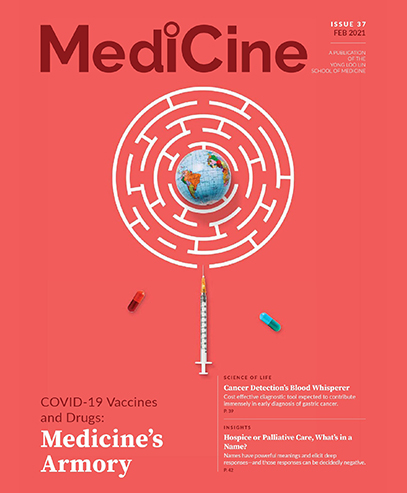The Best Medicine

Dr Benjamin Hooi (centre) with Prof Tan Chorh Chuan, NUS President (right) and Assoc Prof Yeoh Khay Guan, NUS Medicine Dean (left)
Dr Benjamin Hooi (MBBS 2011 and M Med 2016) shares his views on what patients really want.
‘You matter because you are you, and you matter to the end of your life. We will do all we can, not only to help you die peacefully, but also to live until you die.’
— Dame Cicely Saunders, nurse, physician, writer, and founder of hospice movement (1918 – 2005)
When I was a medical student, much of my learning concerned the treatment of diseases; the best way to “make a patient’s sickness better.” As a junior doctor, the focus was largely similar – most of the discussions during ward rounds involved subjects such as “the antibiotic of choice for this patient’s urinary tract infection,” or “the best imaging modality to look for the source of sepsis.”
The first time I recall talking about a patient’s goals of care was as a house officer in the respiratory ward. An elderly man who was bed-bound, uncommunicative and fed through a nasogastric tube (due to previous strokes) had been admitted from his nursing home with pneumonia.
I planned to start the patient on Pip-tazo, to cover for a healthcare-associated Pseudomonas infection. However, the ward consultant looked at the patient and said, “Given this patient’s condition, he will continue to be at risk for respiratory infections no matter what we do. Let’s not escalate beyond Augmentin.” I struggled initially to understand the logic of his decision – how could we allow a patient to receive anything “less” than the “best” treatment?
Over time, though, I began to appreciate the wisdom of applying such principles in clinical practice. I saw many frail, debilitated patients admitted repeatedly to the wards, receiving increasingly complex antibiotics as they developed infections with resistant organisms.
For many of these patients, family members would readily tell us how they felt they were suffering, how they would not have wanted to go on living in this way, and how they themselves were “prepared to let them go.” In a way, it was the doctors who could not “let go.” Every time these patients came to the hospital, the medical teams would feel obliged to prescribe treatment that would “keep them going for as long as possible.” Often, this would involve tubes, injections and lines, with little thought given to whether the patients themselves would have wanted them. Many of these patients would eventually pass on uncomfortably, with all of these interventions still in place.
At the same time, I also started to see that there was a better way. When medical teams realise the importance of centering their treatment around the patient’s preferences and goals, the story often plays out in a far more meaningful manner.
I remember one such case I saw as a medical officer on the nephrology team: a patient with end-stage kidney disease had been admitted with pneumonia and uraemic symptoms. Her family members were initially distressed over whether she should be started on dialysis. They had been told that it could extend her life, but were also aware that she herself had never wanted it. Through several conversations, we gently encouraged them to honour her preference in the matter. They agreed and eventually opted to bring her home to pass away – which was also her wish. In consultation with the inpatient palliative care team, she was started on Fentanyl for comfort and terminally discharged from the hospital. The family was deeply appreciative, and the entire experience left a profound impact on me.
It is of utmost importance that we be doctors who treat patients, not just their diseases. Our care becomes immeasurably more effective and compassionate when it revolves around what is important to the person that we are treating.
